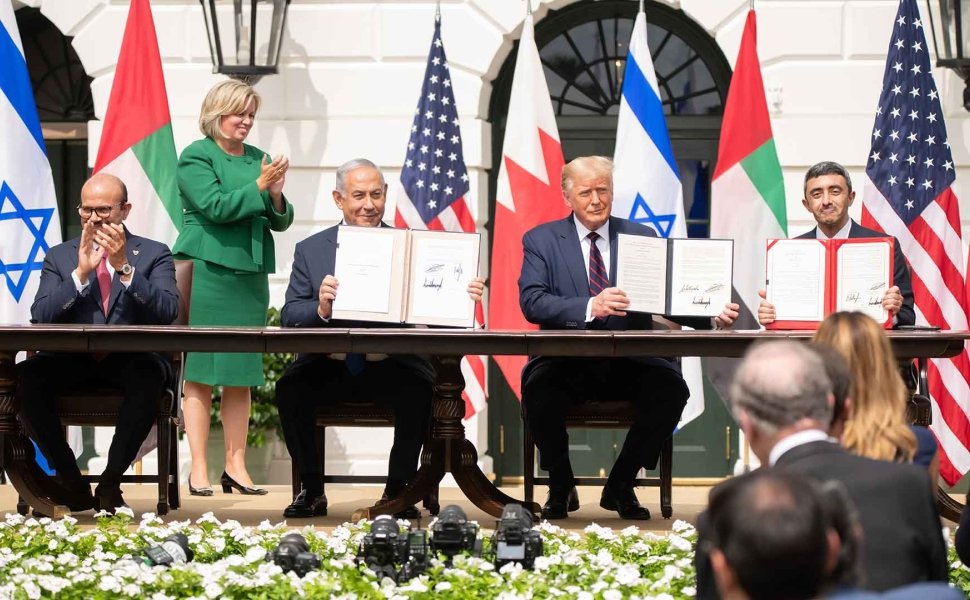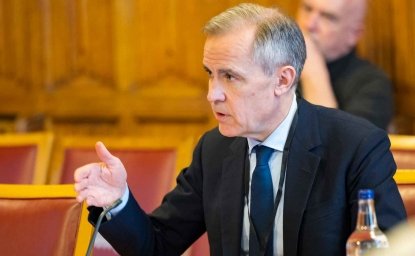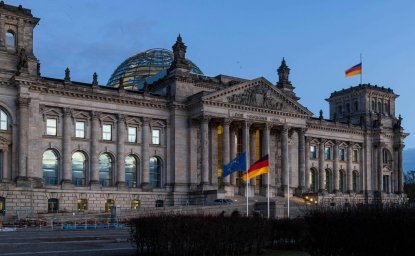Transcript lightly edited
John Milewski:
Welcome to the Need to Know podcast from the Wilson Center, a podcast for policymakers available to everyone. Always informative, nonpartizan and relevant. We go beyond the headlines to understand the trend lines in foreign policy.
Welcome back to another episode of Need to Know. I'm your host, John Milewski. Need to know is a podcast brought to you by the Woodrow Wilson Center. The center is congressionally chartered, scholarship driven, and fiercely nonpartisan. This week, we present the latest in our series of virtual briefings for the new Congress and administration, with a focus on the middle East.
My guest is director, the director of the Middle East program at the Wilson Center. Merissa Khurma. Merissa, welcome. Thanks for joining us.
Merissa Khurma:
Thank you for having me, John.
JM:
So first, let's put aside the headlines from the region for a moment and look at the big picture. If you could provide us with an overview from the US perspective on the current status of relationships.
MK:
Well, the Middle East that this Trump administration is going to work with is a very different landscape than Trump one. And, you know, since October 7th, the geopolitical landscape has changed, particularly after, 15 months of war in Gaza. And as well as various Israeli strikes over the course of the last few months that have severely weakened, Iran.
But also, the Israel Hezbollah war in Lebanon that has also severely weakened Hezbollah. And in Gaza, severely weakened, Hamas. Now, of course, all of these different, proxies of Iran are still there. They are weakened, but they are still there. And for them, that is, victory as they define it. It's their staying power.
But of course, Iran also lost a key ally in Syria after the fall of the Assad regime, which was quite revolutionary, a watershed moment for not only the people of Syria, but for the region. After five decades of Assad ism. So this is a very different landscape. Of course, Israel, which is a key ally to the United States, is also a very different society and a very different country after the horrific attacks of October 7th.
And so there's, lots of changes, across the board. And, it's not the same Middle East that, the first Trump administration was working with.
JM:
When you when you, put together sort of a list of allies and enemies, probably would start with Israel on the top of the list for allies in Iran, perhaps at the bottom of the list for for potential adversaries. What other countries in the region does the U.S. have the best relationships with? And then what are the other countries where there's a lot of work to be done?
MK:
Well, of course, as you said, Israel remains to be, the key U.S. ally in the region. But there are other U.S. allies across the Arab world, including some of, Israel's neighbors, Jordan and Egypt and, of course, the Arab countries of the Gulf of Saudi Arabia, the United Arab Emirates, Qatar, Bahrain, Amman and Kuwait and of course, Haman in Kuwait have taken very neutral positions on various issues and remain particularly with regards to them, and they always remain brokers in various disputes, including opening up, back channels with, between the United States, government, and the Iranian government.
But of course, those are the allies that were, working with that we've been working with. And there are many, many challenges. There's, a new dawn in Syria, but there's a lot of work to do to ensure that, Syria's territorial integrity is intact. To ensure, that there is a political process in Syria that's pluralistic and inclusive, of all the different religious and ethnic groups, across the country.
And of course, to ensure that those who are benefiting from this new Syria and rebuilding, are the Syrian people and not other external actors, which has been the case, of course, with the presence of and influence of Iran and Russia. And so, so the, the this is a vast array of, of countries that are key U.S. allies.
Of course, lots of questions and lots, of opportunities, in Syria, in the Palestinian territories, be it in the West Bank or in Gaza. There's a lot of work to do. This is going to continue to be a very challenging, situation for, the incoming administration in Gaza. There is a severe humanitarian crisis, and over 80% of homes, for example, have been destroyed.
A lot of the infrastructure, water infrastructure, for example, destroyed. So there's a lot of, work to do there in rebuilding. And most importantly, it's to ensure that the Palestinian Authority is, capable of taking, over in Gaza and in ensuring that that they can govern in the, in, in the West Bank as well, because we've seen various, Israeli military operations in the West Bank in the last few months as well.
So those remain to be very challenging. And of course, when it comes to Iran, which, as you mentioned, is at the bottom of the list when it comes to relations with the United States. There have not been diplomatic relations with the United States since essentially, the Iranian revolution. This is going to be a very interesting path forward, because the Iranian regime has always bet on this extensive proxy network that it has financed, and supported militarily, politically, etc., across the region, be it in Iraq, Syria, Lebanon, Russia and Yemen, with the Houthis and, various tentacles have been cut off or have been, severely impacted.
And so that so-called axis of resistance strategy, no longer holds for the Islamic Republic. And so there may be options for diplomatic openings or for some sort of dialog. But if we know one thing about the Trump administration, given the policy that they pursued, in, in President Trump's first term is that it was more of a maximum pressure policy.
And so that is going to be, very interesting moving forward to see how this incoming administration will navigate the Iran challenge.
JM:
I know it's difficult to generalize. Relatively speaking, though, does the Trump administration inherit, the middle East, where it has more influence or less influence than it did last time around? In other words, has the calculus changed as far as regional feelings about the U.S.? Its standing, how much it's trusted, whether it's seen as being strong or weak.
What can you tell us in that regard?
MK:
I think there is a difference between, how the United States is viewed by the people of the region and, of course, how the various governments and regimes will sure will act. Right. So I think if you're asking about, well, how is U.S. standing in the region? I think it's unfortunate that the Biden legacy, particularly in foreign policy in the Middle East, is one that's associated with death and destruction and war, particularly in Gaza and in Lebanon.
And, the United States has lost a lot of credibility amongst the people of the region, particularly in the Arab, and predominantly, you know, Muslim world. However, the governments in the region are also very pragmatic. They want the United States to be involved. They want and believe that U.S. leadership is needed to address the various conflicts, the the longstanding conflict to end the war.
And I think we saw that very clearly in this, the latest round of ceasefire and hostage negotiations, which many people have, commented, with knowledge of these discussions, that Trump's pressure, paid off, in ensuring that it goes through. And so,
JM:
Because Melissa, is that mersa is that because Hamas thought it couldn't get a better deal by waiting for Trump to take office?
MK:
I think because there was pressure exercised on or exerted on both sides, it was clear that Bibi Netanyahu was also under pressure, even though we know very well that he was equally under pressure from his own coalition government. In fact, we've seen one of the right wing ministers resign over the cease fire deal. And then the second one, Minister Smotrich, who reportedly, has said that Bibi promised him to go back to fighting Hamas right after phase one of the cease fire.
And so what drove this deal home, which was a long overdue deal that was outlined by President Biden in May, is pressure on both sides. Of course, Hamas is. Calculus has also shifted because it lost and was the mastermind of October 7th and various other leaders. It has also, lost, weaponry and some military infrastructure, but unfortunately, they were also able to recruit, almost the same number of people that have been killed.
According to U.S. intelligence that Secretary Blinken highlighted in his last foreign policy address. And so, those are all, important, developments. But we have to wait and see, how the Middle East policy will evolve with this incoming, Trump administration.
JM:
What is your confidence level that the cease fire can hold as yet long overdue, but also still very delicate.
MK:
You know, it's very difficult to have, confidence, high confidence levels when it comes to, these situations, particularly in the Middle East. I think the hope not just amongst, you know, policy makers who, want to, you know, move forward to, day two or the day after, but, but also amongst the families of the hostages that still remain with Hamas and other, factions in Gaza, as well as amongst Palestinians who have endured, hardships that are unfathomable in the last 15 months.
The hope is that it will hold and that we'll be able to move from phase one to phase two and see more hostages released. In exchange for Palestinian prisoners, but also a much needed humanitarian aid that, that is also started to, trickle in. Much more significantly, since the cease fire, kicked in.
JM:
What would what would be the best thing for U.S. policymakers to do to support this cease fire and to see that it moves from stage one to stage two? Is the U.S. in a position to influence that, or is it pretty much hope for the best and let the players on both sides work it out?
MK:
So the United States is one of three countries that are guarantors of this ceasefire slash hostage agreement. They worked on brokering it, at a time when the transition team between the Biden and Trump administration were very actively involved in these talks. And I think this was a great example of of how, two administrations that may not see eye to eye have actually worked together towards achieving, a very important, agreement.
And so the other two countries are, of course, Qatar and Egypt, because both of them, are key in brokering this deal with Hamas. So those are three countries that have to ensure that this, agreement holds. But there are other neighboring countries in the region and key U.S. allies that have to ensure that, that keep the pressure on, and, and ensure that, you know, we're able to move smoothly from phase one to phase two to phase three and start conversations about what postwar Gaza will look like, particularly for the innocent civilians in the strip.
JM:
You know, as I mentioned at the outset, it's we would put the headlines in the on the back burner temporarily, but it's impossible to put them there for any great amount of time because we're talking about death and destruction and really horrific humanitarian, humanitarian crisis. Even with a ceasefire, the needs are great. But having said that, tell us about the trend lines, what's happening regionally that policymakers who want to have a forward looking approach should be thinking about?
You know, over the years, we've heard about things like, a youth bubble, demographic changes. What are things that U.S. policymakers need to be acutely aware of when they look at the trend lines in the Middle East?
MK:
So I think, you know, beyond just the discussions we were having, that very much focused on conflict and post-conflict scenarios. You know, on the, on the challenge side, we do have, very large forced, displaced populations all across the region and forced displacement becomes, continues to be a very significant challenge, not only in the Levant or the Middle East, parts of the region, but also in North Africa.
And that's something that we have to be mindful of. And with a, youth bulge, which continues to be the case when it comes to the Mena region, there are challenges when it comes to, unemployment and workforce development, but there are also various opportunities. And I think most of that, most of the good stories are in the, Arab countries of the GCC because they have been very aggressive with their economic development plans and visions for the future.
In an effort to diversify away, basically from oil and gas. And so, there are movements forward towards, digitizing the economies of the region, training youth, and, and supporting entrepreneurship. I think this is one of the, more positive stories coming out of the region, particularly when it comes to, leaders in the region, in AI, in the digital economy, in the United Arab Emirates.
Others such as Bahrain, Saudi Arabia and, and cut that are following suit, but also highly highly educated workforce that is very much ready. In other countries that have high unemployment rates, including Jordan, Egypt, Tunisia, and, and in Lebanon, which, you know, we we we didn't discuss, but there are tremendous opportunities there and a very narrow political window of opportunity to move forward now with the election of the president.
And so, those are the trend lines that we have to be looking at there have various, you know, agreements that have been signed between, the Abraham Accords countries and Israel in the last few years on the trade front. And when the conflict ends, particularly, you know, in the Palestinian territories and Israel, there will be more opportunities for normalization, primarily with Saudi Arabia, but also other Muslim majority countries.
And so, we have to be looking at, all of these windows of opportunity, but they're also very much interconnected with the developments on the ground and how we move forward past just ending the war, but also towards rebuilding and post post-conflict rehabilitation.
JM:
I'm going to cling to this glimmer of hope or some good news for the region and ask you specifically, I know embedded in what you just said is the role of women and the changing role of women. But can I get you to talk about that specifically?
MK:
Yeah, absolutely. I think this is a huge opportunity, particularly in the Palestinian territories and Syria and Lebanon and a lot of the areas that, in countries where, we're will be foreseeing more changes. I've been in conversations with various Syrian political women activists just in this past week. And they are on the ground, they've already held a press conference to bring all women actress together.
And they have a very clear goal to ensure that there's a minimum of 30% women participation in decision making positions. And, and across government, positions in Syria. So that's encouraging. But of course, there's a lot work, a lot of work to do similarly in Lebanon, and very much needed in the Palestinian territories where there, there basically are no women are to be seen in the, political echelons of whether the political the Palestinian Authority of or other entities, certainly not in Hamas.
But I can tell you that that that the civil society level, at the grassroots level, those organizations who have been working with Israeli organizations with a very clear vision of peace and a two state solution, a lot of them are women leaders, and that is where the whole place.
JM:
Merissa, thank you very much. And I want to tell those who are listening or watching our program, you know, we've offered these what we call virtual briefings with a new Congress and a new administration in the white House coming in. And but, you know, the Wilson Center has more to offer you on an ongoing basis. And if you come to our website and you look under the programs tab, you could find the Middle East program and all the work of Merissa.
Merissa, I've done that twice today. I've called you Melissa, and I apologize for that. Merissa and her and her colleagues, great work. And as always, thank you for a concise and focused briefing on the really important issues on a broad range of countries.
MK:
Thank you so much for having me, John.
JM:
Our guest has been Merissa Kerber, director of the Wilson Center's Middle East program. We hope you enjoyed this edition of Need to Know and that you'll join us again soon. Until then, for all of us at the Wilson Center, I'm John Milewski. Thank you for your time and interest.













